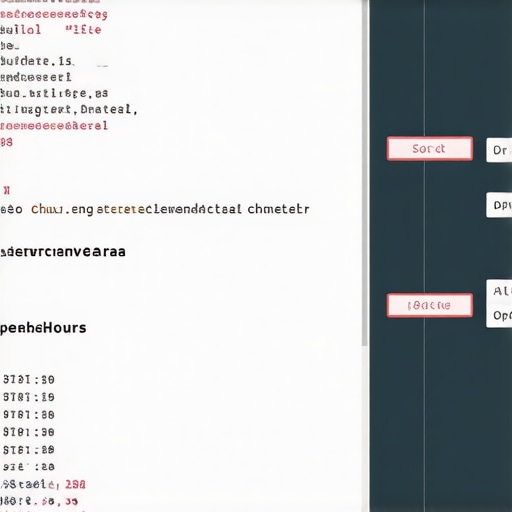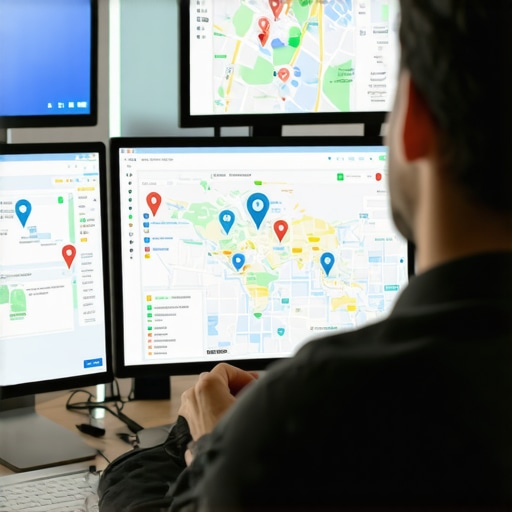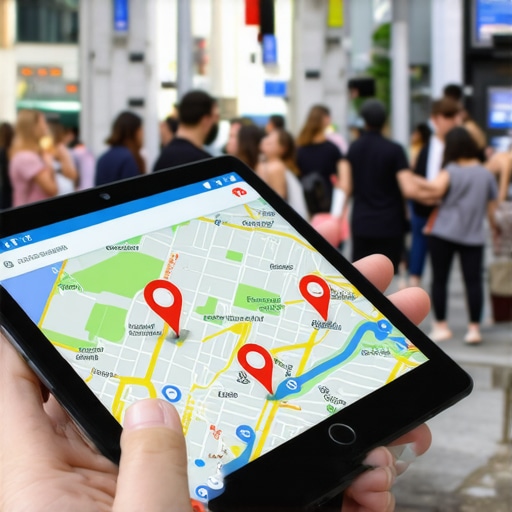Ever Wonder How Local Businesses Are Conquering Google Search?
If you’ve ever searched for a nearby cafe, plumber, or boutique and noticed some businesses pop up with glowing reviews, prime placement, and a tantalizingly complete profile—well, they’ve cracked the local SEO code. Today, we’re diving into the art and science of Top Local Search Strategies that can elevate your Google My Business (GMB) presence from obscurity to top-tier visibility.
Why Local Search Is the Unsung Hero of Digital Marketing
Let’s face it—most consumers are in a hurry, and when they need a service or product nearby, they turn to Google. Your business’s ability to appear prominently in local search results can make or break your sales figures. But what’s the secret sauce? It’s a blend of GMB optimization techniques, strategic keyword use, and reputation management. Think of local SEO as your digital handshake—firm, confident, and memorable.
What’s the Real Deal Behind GMB Optimization?
Is Your GMB Profile a Fake or Fabulous?
Many businesses leave their profiles half-baked—missing photos, outdated info, or zero reviews. Here’s the truth: a fully optimized GMB profile is like a well-staged storefront. It’s complete, accurate, and engaging. For instance, regularly updating your contact info, opening hours, and adding high-quality images can significantly boost your local search rankings. If you haven’t yet explored the latest GMB optimization techniques, now’s the time to get serious.
Are You Using Local Keywords Like a Pro?
Imagine searching for “best pizza near me.” Google’s algorithm is smart—it recognizes local intent and tailors results accordingly. Incorporate relevant local keywords naturally into your business description, posts, and Q&A sections. This isn’t keyword stuffing; it’s speaking Google’s language. Want to see how top-ranking businesses do it? Check out top local search strategies for 2024 insights.
And don’t forget reviews—gather them, respond to them, and leverage them. Reviews are your reputation currency, and Google loves fresh, positive feedback.
How Can You Keep Your Edge in a Crowded Market?
Consistency is king. Regularly posting updates, special offers, or local news on your GMB profile keeps your business fresh in both customers’ minds and Google’s algorithms. Plus, engaging with your audience by answering questions or responding to reviews builds trust and authority. It’s about creating an authentic connection that turns searches into sales.
Is Your Local SEO Strategy Future-Proof?
Absolutely—by integrating your local SEO efforts with broader effective SEO services and staying abreast of algorithm updates, you can stay ahead of the curve. Remember, local SEO isn’t a one-and-done deal; it’s an ongoing process of refinement and adaptation.
So, are you ready to elevate your local search game? Share your thoughts below, or explore more about how boost your GMB rankings today!
Unlocking the Next Level of Local Search Domination
As the digital landscape evolves, so do the tactics needed to stay ahead in local search rankings. While basic GMB optimization lays the foundation, savvy businesses are now exploring layered strategies that integrate local SEO with broader digital marketing efforts. Have you considered how advanced local SEO techniques can exponentially increase your visibility and attract more local customers? The answer lies in a nuanced approach that combines technical precision, content relevance, and reputation management.
Why Are Traditional GMB Tactics No Longer Enough?
Many local businesses rely solely on standard practices—verifying their GMB profile, adding photos, and encouraging reviews. Yet, in 2024, Google’s algorithms are more sophisticated, prioritizing user intent, engagement metrics, and consistency across digital channels. According to Moz’s latest insights, a comprehensive local SEO strategy should include structured data markup, localized content, and personalized interactions to truly stand out.
Can Your Business Keep Up with the Algorithm’s Next Moves?
Anticipating future changes is crucial. Google’s recent updates emphasize AI-driven relevance and voice search optimization. Is your online presence prepared for voice queries like “Where’s the best coffee nearby?” or AI-curated results? Leveraging schema markup for local business details, services, and FAQs can help your business become a featured snippet or voice search result, expanding your reach significantly.
Moreover, integrating your GMB profile with your website via consistent NAP (Name, Address, Phone Number) data and localized keywords enhances trust signals and boosts rankings. Want to see how top-tier brands tailor their local SEO efforts? Check out top local search strategies for 2024 for detailed tactics.
How Is Reputation Management Elevating Local Search?
Reviews are more than just social proof; they are a critical ranking factor. In 2024, proactive reputation management—responding promptly to reviews, addressing negative feedback professionally, and encouraging satisfied customers to share their experiences—can enhance your local authority. Additionally, implementing review generation campaigns integrated with your email marketing or POS systems can streamline this process.
Did you know that reviews with specific keywords can improve your local keyword signals? For example, “excellent plumbing repair” or “delicious vegan pizza” embedded naturally in reviews can strengthen your relevance for those searches. To further boost credibility, consider adding rich media like photos or videos to your review responses, which Google often favors.
What’s the Impact of Hyperlocal Content and Engagement?
Creating hyperlocal content—such as blog posts about community events, local news, or collaborations—can position your business as a community staple. When paired with active engagement through social media and local directories, this approach amplifies your visibility. Google’s algorithm rewards consistent, fresh, and community-focused content, making your business more discoverable during local searches.
Furthermore, engaging with local influencers and participating in community events can generate valuable backlinks and citations, strengthening your local SEO profile. Interested in how to seamlessly integrate these tactics? Explore ultimate local SEO strategies for a comprehensive approach.
Are You Ready to Transform Your Local Search Presence?
Implementing these advanced strategies requires a strategic mindset and consistent effort. If you’re eager to elevate your local rankings and attract more nearby customers, now is the perfect time to refine your approach. Share your insights or questions below, or consider reading more about proven GMB optimization tactics to accelerate your success today!
Harnessing Local Schema Markup to Outrank Competitors in Hyperlocalized Searches
One of the most underutilized yet potent tools in local SEO is structured data markup. By implementing schema.org vocabulary tailored for local businesses, you can communicate nuanced details about your services, operating hours, and geographic context directly to search engines. This semantic clarity not only enhances your visibility in rich snippets but also positions your business as a highly relevant result for voice searches and Google’s AI-driven features. For instance, integrating LocalBusiness schema with specific attributes like serviceArea and areaServed allows your profile to stand out in crowded local results.
According to Moz’s 2024 Local SEO Guide, businesses leveraging schema markup see an average increase of 15-20% in click-through rates from local search results, underscoring its strategic importance. Advanced practitioners also combine schema with JSON-LD implementation to ensure seamless integration with existing website code—improving both crawlability and data accuracy.
Leveraging AI and Data Analytics to Personalize Local Search Experiences
Traditional local SEO tactics focus on static signals—NAP consistency, reviews, and localized content. But the future lies in harnessing artificial intelligence and big data to deliver hyper-personalized search results. By analyzing user behavior patterns, location data, and interaction history, you can tailor your content and offers to match individual search intents. For example, if data indicates a user frequently searches for eco-friendly products, your local ads and content can emphasize your sustainable offerings, increasing relevance and conversion likelihood.
Tools like Google Analytics 4 and specialized AI-driven SEO platforms can help you identify micro-moments and predictive trends. Integrating these insights into your local SEO strategy not only boosts your rankings but also enhances customer engagement and loyalty. For an in-depth understanding, consult the recent study by Search Engine Land’s expert roundtable on AI in local SEO.
What Are the Nuanced Challenges of Voice-Activated Local Searches?
How can businesses optimize for the rise of conversational AI queries?
Voice search optimization presents a nuanced challenge because it involves understanding natural language, long-tail queries, and contextual nuances. Unlike typed searches, voice commands are more conversational and often question-based—”Where can I find the best gluten-free bakery near me?” To adapt, your content should incorporate long-tail keywords, question-based FAQs, and local intent signals.
Implementing structured data for Q&A sections, optimizing for featured snippets, and ensuring your business information is accurate across all digital touchpoints are essential. Moreover, considering the rise of AI assistants like Siri, Alexa, and Google Assistant, your business should aim to be a featured snippet authority, which involves crafting concise, authoritative answers to common local questions.
According to BrightLocal’s 2024 Voice Search Report, 58% of consumers use voice commands for local searches, making this an urgent area for strategic focus. Want to stay ahead? Dive into schema markup and voice search optimization tutorials from authoritative sources like Moz and Search Engine Journal.
Conclusion: Future-Proofing Your Local SEO Arsenal
As local search algorithms evolve, so must your strategies. Combining technical tactics like schema markup, data-driven personalization, and voice search optimization with ongoing reputation management and hyperlocal content creation will secure your place at the top of search results for years to come. Remember, the key to sustainable dominance is continuous learning and adaptation—embrace the latest tools, analyze your data meticulously, and refine your approach accordingly.
Are you ready to elevate your local SEO game to expert levels? For more insights, explore our comprehensive guides and stay tuned for the next wave of local search innovations. Your next customer is just a search away—make sure they find you!
How Can Hyperlocal Content Strategies Outshine Your Competitors?
Leveraging hyperlocal content is a sophisticated approach that positions your business as an integral part of the community fabric. By creating detailed, engaging blog posts about local events, partnerships, and community stories, you enhance your relevance and authority in local searches. This tactic not only attracts organic traffic but also encourages backlinks from local news outlets and influencers, further bolstering your search presence. Integrating user-generated content such as local reviews and testimonials into your hyperlocal strategy can amplify authenticity and trust, making your business a go-to resource for nearby consumers.
What Are the Benefits of Implementing Advanced Schema Markup for Local Search?
Utilizing structured data through schema markup is a game-changer in local SEO. Beyond basic business information, advanced schema types like Service, Offer, and Event enable search engines to understand nuanced aspects of your offerings. This semantic clarity can trigger rich snippets, enhanced listings, and even voice search optimization, positioning your business at the forefront of local results. Recent research from Moz’s 2024 Local SEO Guide highlights that businesses employing comprehensive schema markup see a measurable increase in click-through rates—sometimes by over 20%. Proper implementation requires meticulous attention to detail, ensuring every relevant aspect of your business is accurately represented in the code.

Incorporating schema markup visually represented as an annotated website code snippet demonstrating local business schema integration, highlighting key attributes like serviceArea and openingHours.
How Is Data-Driven Personalization Elevating Local Search Results?
Harnessing the power of AI and big data analytics transforms generic local SEO efforts into highly targeted campaigns. By analyzing user behavior, search patterns, and engagement metrics, businesses can tailor content, offers, and even advertising to match individual preferences. For example, a local eco-friendly store might target customers showing interest in sustainable products with personalized promotions or content. Tools like Google Analytics 4 and AI-driven platforms enable marketers to identify micro-moments—those critical points when consumers are most receptive to your message—and optimize accordingly. This precision increases conversion rates and fosters long-term loyalty, as consumers feel understood and valued.
Are You Prepared for the Next Wave of Voice-Activated Local Searches?
The rise of voice assistants has transformed how consumers find local businesses. To stay ahead, your strategy must incorporate natural language optimization, long-tail keywords, and structured data for Q&A. Voice searches often involve questions like “Where is the best vegan restaurant near me?” or “Can you recommend a reliable plumber in downtown?” Adapting your content for conversational queries and ensuring your NAP consistency across all platforms are critical. Moreover, optimizing your Google My Business profile for voice search involves crafting clear, concise responses to common questions, increasing your chances of being featured as a voice-sourced answer. According to Search Engine Land’s 2024 report, over half of mobile searches now involve voice commands, underscoring the urgency of integrating voice SEO into your local marketing arsenal.
What Are the Key Metrics to Measure the Success of Your Advanced Local SEO Strategies?
Tracking the right metrics ensures your efforts yield tangible results. Focus on local pack visibility, click-through rates from rich snippets, and engagement levels such as review volume and sentiment. Additionally, monitor the impact of schema markup and hyperlocal content on your rankings through tools like Google Search Console and third-party SEO platforms. Data-driven insights allow for continuous refinement, ensuring your strategies adapt to algorithm updates and evolving consumer behaviors. Remember, the ultimate goal is not just visibility but also meaningful engagement that drives foot traffic and conversions. Regularly reviewing your local SEO KPIs helps maintain a competitive edge and informs future tactics.
Expert Insights & Advanced Considerations
Leverage Structured Data for Rich Snippets
Implementing schema.org markup tailored for local businesses enhances your visibility through rich snippets and voice search features. Proper schema markup communicates nuanced business details to search engines, increasing click-through rates and positioning your business as a top local result.
Harness AI and Big Data for Personalization
Utilize AI-driven analytics to analyze user behavior and tailor content and offers. Personalization based on micro-moments and predictive trends boosts engagement, loyalty, and local search rankings, making your business more relevant to nearby consumers.
Optimize for Voice Search and Conversational Queries
With over half of mobile searches involving voice commands, adapting your content for natural language, long-tail keywords, and structured Q&A sections is essential. Crafting concise, authoritative answers increases your chances of appearing in featured snippets and voice assistant results.
Maintain Consistent NAP Data Across All Platforms
Ensure your Name, Address, and Phone Number (NAP) are accurate and uniform across your website, GMB profile, and local directories. Consistency builds trust with search engines and improves your local SEO performance.
Engage in Hyperlocal Content and Community Engagement
Create content focused on local events, news, and collaborations to position your business as a community staple. Active engagement and backlink building from local sources amplify your visibility in local searches.
Curated Expert Resources
- Moz’s 2024 Local SEO Guide: Offers comprehensive insights into algorithm updates and advanced optimization techniques.
- Search Engine Land’s AI & Local SEO Roundtable: Deep dives into AI-driven personalization and future trends.
- Schema.org LocalBusiness Markup: Official documentation for implementing rich snippets and structured data.
- BrightLocal’s Voice Search Optimization: Strategies for optimizing for voice queries and conversational AI.
Final Expert Perspective
In the ever-evolving landscape of local search, mastery lies in integrating advanced schema markup, leveraging AI for hyper-personalization, and optimizing for voice queries. These strategies, combined with consistent NAP data and active community engagement, position your business as a dominant local presence. Staying ahead requires continuous learning and adaptation—embrace these expert insights to elevate your local SEO game and outshine competitors. Share your expert tips or explore further resources to deepen your mastery of local search domination.




This post really dives deep into the multifaceted nature of local SEO, especially in 2024 where algorithms are becoming more sophisticated. I’ve personally seen how implementing schema markup and leveraging review keywords can significantly boost local visibility. One challenge I encountered was maintaining NAP consistency across various directories—it’s tricky but pays off in rankings and trust. Has anyone found effective tools or strategies for automating or simplifying this process? I’m curious if others are integrating AI tools to analyze micro-moments or optimize voice search — I believe these are the next big frontiers. It’s also fascinating how hyperlocal content and community engagement can humanize a brand and build authentic trust, which seems equally as important as technical tactics. Overall, continuous monitoring with tools like Google Search Console really helps refine these efforts. How does everyone balance the technical and community-focused aspects of local SEO in their strategy? Would love to hear insights or tips, especially for small businesses trying to stretch limited resources.
This post really highlights how critical integration is in local SEO. I’ve been experimenting with schema markup on my local business website and saw a noticeable increase in click-through rates within just a few weeks. The part that resonated most was the emphasis on hyperlocal content and community engagement. From my experience, collaborating with local influencers and hosting community events not only fosters goodwill but also generates authentic backlinks, which boost rankings further.
One challenge I faced was ensuring NAP consistency. I started using tools like BrightLocal and SEMrush to streamline listings updates, which made a difference. Have others found any tools that excel at keeping NAP data synchronized across multiple directories automatically?
Also, with voice search on the rise, I’ve begun optimizing FAQs and using conversational long-tail keywords. Do you think investing in voice search optimization offers a tangible ROI for small businesses, or is it still a niche? Would love to hear other practical tips on balancing technical SEO with community-focused efforts in a limited-resource environment.
This article really emphasizes the importance of combined technical and community-focused strategies in local SEO. From my experience managing a small café, regularly updating our GMB profile with fresh photos and engaging content has noticeably increased our local visibility. But, I’ve also realized that balancing hyperlocal content creation with technical SEO efforts like schema markup can be challenging, especially with limited resources.
What I’ve found helpful is leveraging local partnerships to generate authentic content—shared events or community news—while automating NAP consistency updates using tools like Yext or SyncYourListings. For those experimenting with AI, have you considered using it for content ideas or review analysis? It feels like a promising avenue to maximize limited time.
Additionally, voice search optimization remains somewhat niche, but I believe with the rise of smart speakers, it’s worth investing in FAQs and natural language content. Have others noticed a measurable ROI from voice optimization strategies?
Looking forward to hearing how others are merging these tactics—any tips for small businesses aiming for a holistic approach without breaking the bank?